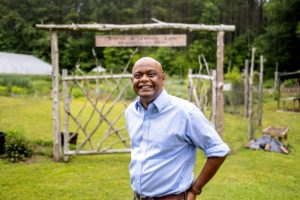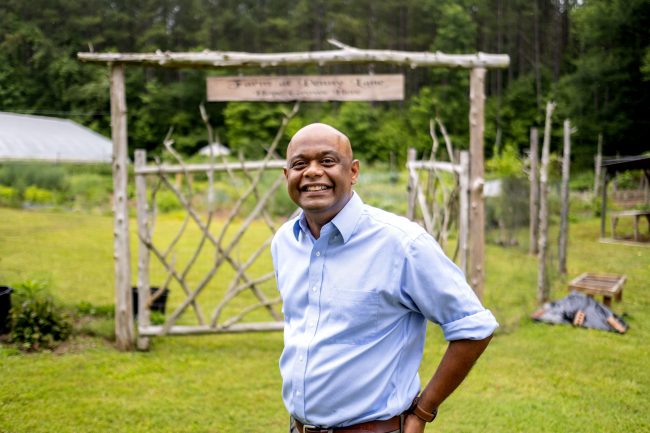The Farm at Penny Lane’s innovative programs help mental health clients become more self-sufficient.

The Farm at Penny Lane’s innovative programs help mental health clients become more self-sufficient.


The place at the end of the bumpy dirt road looks and sounds like many farms in rural Chatham County. Dogs bark and a rooster crows when visitors arrive. Glossy black-feathered chickens peck in the grass around the coop and a collection of outbuildings. A few people in shorts and T-shirts dig up beets and turnips in a half-acre garden plot.
But the writing carved into the wooden sign above the garden gate shows the difference at the Farm at Penny Lane: “Hope Grows Here.”
“We want the farm to be a place where we create initiatives and demonstrate that they are effective and can change people’s lives,” said Thava Mahadevan, director of the Farm at Penny Lane and of operations at the UNC Center for Excellence in Community Mental Health, part of the School of Medicine.
The center, in partnership with the nonprofit XDS Inc., operates the 40-acre property just six miles south of campus to provide services to approximately 2,000 people in the Triangle area with serious mental health conditions, addictive disorders or intellectual and developmental disabilities. The farm’s innovative programs include harvesting and processing produce, horticultural therapy, a farmer-led gardening group, yoga, cooking classes and a program for training support dogs.
Established in 2011, the farm provides services that Mahadevan said these clients can’t get at traditional hospitals and clinics. Therapy and medicine are important for people impacted by mental illness, but they only address about 30 percent of their health and quality of life issues, he said. The Farm at Penny Lane addresses many others: exercise, a good diet, social interaction, work and life skills, accomplishment and an opportunity to improve their confidence and self-sufficiency.
Taking the harvest from farm to home
People with severe mental disorders on average tend to die 10 to 25 years earlier than the general population, according to the World Health Organization. While suicide is one cause, most of the deaths are due to preventable chronic physical medical conditions such as cardiovascular, respiratory and infectious diseases, diabetes and hypertension.
That’s why the farm, for a nominal fee, offers the Farm-to-Home Produce Pack Program to mental health clients who are on the federal Supplemental Security Income of $750 a month.
Participants in the program receive fresh, organically grown produce and eggs weekly or bi-weekly in season. “We want them to avoid cheap food such as 99-cent meals. Instead, we encourage them to take center classes on cooking or on eating healthy for under $5 a day,” Mahadevan said.
The garden also gives clients valuable work and social experience. Early in the morning, clients, staff members and volunteers check the whiteboard to see which crops are ready for harvest before going into the garden. Row by row, they check the plants, digging up carrots, beets and turnips, picking strawberries and fresh herbs and harvesting heads of crisp lettuce.
Carrying full buckets or pushing wheelbarrows, they bring the produce to the farm’s kitchen, where they carefully wash it with a garden hose then bring it inside to be packed in bags and boxes. After the work is done, they’ll cook lunch and eat together.
The garden also plays a role in weekly sessions led by a registered horticultural therapist from the North Carolina Botanical Gardens. Offered year-round, these sessions focus on both indoor learning and outdoor gardening in an inclusive group setting. The activity, fresh air and healthy produce can help participants improve their physical health, while interacting with others and productive work benefits their emotional and social health.
Before they can participate, clients are referred by a therapist, physician or mental health clinical team, and farm program manager Matt Ballard meets with them individually to complete the screening process.
“People get a sense of belonging and self-efficacy,” Ballard said of the participants. “They’ve felt like they don’t fit in because of their diagnosis, so it helps to get a sense of accomplishment and take risks with social interaction.”
More than gardening
Gardening is only part of life on the farm. Penny Lane is also home to the UNC PAWS therapy program. The program rescues dogs from local shelters to be trained for adoption as pets or support animals. The people doing the training are mental health clients and others with developmental disabilities, who supervise puppy playtime and join dog-walking groups — skills that improve their own self-confidence and teach them responsibility. PAWS coordinator Sunny Westeman estimates that PAWS has served over 60 people.
A 375-square-foot model home signals the farm’s latest venture, the Tiny Homes Village, a project that Mahadevan is co-directing with Amy Blank-Wilson, an assistant professor in the School of Social Work. The plan is to build 15 of these tiny homes in a circle near the garden to create a village where residents will live, work and thrive. The Tiny homes Village initiative is a partnership between XDS Inc. and School of Social Work. Hobbs Architects created plans for the permanent houses, and a Triangle Community Foundation grant provided the seed money for construction of the model home built by Bold Construction.
The venture addresses another major challenge for mental health clients on a fixed income: finding affordable housing. The tiny homes will rent through subsidy or for $250 per month. Mahadevan foresees the project as a template for similar villages in rural and urban areas, possibly with connections to community colleges and universities.
Other plans include using an existing house for short stays as clinical interventions when a client nears a crisis. The “bed and breakfast” concept reduces emergency room visits and costly hospital stays.
Some clients have lived in the model home briefly and given meaningful feedback. “They told us that it felt like a real home or even better,” Mahadevan said.
This attention to issues like work, home and socialization are all evidence of why hope grows here for the clients served at the Farm at Penny Lane.
“They keep saying, ‘I’m not judged here. I don’t have to face the stigma of mental illness when I come here,’ which is important because stigma is a huge challenge,” Mahadevan said. “I’m sure we’ll make mistakes, but we will keep evaluating what we do here. We want them to live through their illness and have a normal life.”
This article appeared in the online version of the University Gazette.